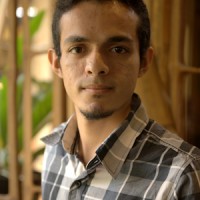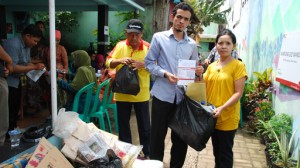
Garbage Clinical Insurance (GCI) is a micro health insurance program which uses garbage as a financial resource. With this program, the community pays clinical services by using garbage in an insurance scheme. This way GCI can make the community mobilize their own unused resources to improve health access and breakdown barrier between health facilities and community. GCI opens up access to health.
i-genius spoke with Gamal Albinsaid, participant on UK/Indonesia Study Tour and the founder of Garbage Clinical Insurance to find out more.

i-genius: How did you get started with Garbage Clinical Insurance?
Gamal Albinsaid: I believe that health is a fundamental human right. Hovewer, in reality many people can not get health access because they do not have sufficient money and the cost for medication is expensive. Indonesia has a huge problem regarding access to healthcare. Many people can not get access to health care due to financial factors. For example, the true story of a 3-year-old girl, Khaerunissa, that happened June 5, 2005. She was the daughter of a 38-year-old scavenger, Supriyono, who only earned 10,000 every day. She got diarrhea, but she could not get access to health services due to unaffordable health cost. Finally, she died because of diarrhea. In responding to this heart-breaking social phenomenon, then, we started to think how we could create health financing model which permitted all people to get health access. Garbage is the best solution because almost every day every house produces garbage which is not used, so that all citizens can join our program. This motivated us to the develop garbage insurance scheme as health financing that we call Garbage Clinical Insurance.
i-genius: How does garbage become a financial resource?
Gamal: Financially, the program is supported by the community through the trading of waste. With this program, community gives their garbage to the clinic regularly. Afterward, the collected garbage is processed into health fund. We make money from a lot of waste entrepreneurship. First of all, organic waste is processed to be fertilizer by applying composting method. Secondly, inorganic waste, such as paper, cans, bottles, plastic, is reused and recycled. We also conduct others specific waste processing and entrepreneurship.
i-genius: What difficulties did you experience setting up GCI?
Gamal: To build sustainability, we must build a sustainable financing system, service system, quality control, and prepare resources. The hardest challenge we face is the community participation because this micro insurance system needs a lot of members to maintain our program. Advocating the leader in the community and commuity organization approach, which is a strength in both cultural and structural schemes, is the solution for this problem.
Our team focuses on the stage of development in GIC into massive duplication and scientific approach for this new garbage insurance scheme by creating new programs in other regions (initiation), ensuring the power of sustainability (stabilization), and society Independencing (independence). In developing this product, we have applied scientific aspect and research in order to make the referral program as a role model or a reliable innovative micro-insurance.
Given that the goals of public health, which in principle is to gather public potentials or resources that exist in the society itself to the efforts for promotive, preventive, curative, and rehabilitative and to be able to manage the health resources independently, then one of our focuses is to establish the independence of the program. Because the main focus of this insurance program is to collect garbage public resources. Garbage Clinical Insurance is independently and sustainably maintained by community organization.
i-genius: How has GCI grown?
Gamal: The main principle of Garbage Clinical Insurance is organizing community to create sustainable financing from their own resources in order to improve the access and the quality of public health program from the promotive, preventive, curative and rehabilitative aspects. On the other side, it becomes an incentive for the community to start a proper waste management and waste entrepreneurhip from household level. To a certain extent, it also contributes to local sanitation improvement. Garbage Clinical Insurance increases garbage value exponentially, so Garbage Clinical Insurance empowers every individual to mobilize overlooked resources and take an active role in managing health financing. We change the perception and habits of the community to garbage with new inovation system of garbage insurance scheme. We promote health investments with garbage.
Finally, we’re empowering every individual to mobilise overlooking resources and take an active role in managing health financing. Were changing the perception and habits of people in the community, too.
i-genius: Why is good health good for the community?
Gamal: Currently, although standard clinics concentrate their efforts on treating the sick people, GIC applies a holistic health system that allows residents to use funds from their garbage production to seek out preventive care in addition to curative or rehabilitative care. For example, GIC also conducts creative health education and promotion in specific topics regarding health promotion about geriatric diseases for elderly people, health pregnancy, childbirth, and the importance of breast feeding for pregnant and lactating mothers, reproductive health for adolescents, clean and healthy lifestyle for kindergarten children. Furthermore, GIC creates and distributes a health book, holds a nutrition consultation service, conducts home visits, laboratory studies for patients with chronic diseases, and prepare ambulance for community. GIC has also developed telemedicine to provide individuals with health counseling by telephone for free. All of these programs are paid with garbage from the community.
i-genius: What’s your favourite hobby right now?
Gamal: Reading books about politics, religion and philosophy, because it’s allows my mind to roam free while keeping my heart grounded.
i-genius: What is your favourite motto in life?
Gamal: Don’t proud with your ideas, just focus on problem which you want to solve.
i-genius: What was it like to meet Prince Charles?
Gamal: When I was announced as the winner and met Prince Charles, I felt, God is very kind to me and I am very grateful. Prince Charles was said “I would like to give my warmest congratulations to Gamal Albinsaid for his marvellous initiative”
i-genius: What’s the worst business advice you’ve ever received?
Gamal: Economic principle is the smallest capital to gain maximum profit.
i-genius: What advice would you give to those starting up a social business/project?
Gamal Albinsaid: I keep telling my staff that there are many people who have bright ideas but cannot realize them, and that they are surprised when others make it happen. I think those people do not have enough passion. If they had sufficient passion, they would keep on thinking and pursuing. When we have an idea but we only pursue it on our own, at some point, when we feel tired, we may stop. With a spirit of togetherness, we can push through those moments. My principle is to stay sincere because even if you’re not, you still have to spend time and energy, so it’s best to give your all.
This interview was conducted as part of the i-genius Getting Started interview series. If you would like to learn how to get started in your social business, then why not take our ‘Getting Started – Social Business Start Up’ online course with i-genius Academy. To find out more, click here!

